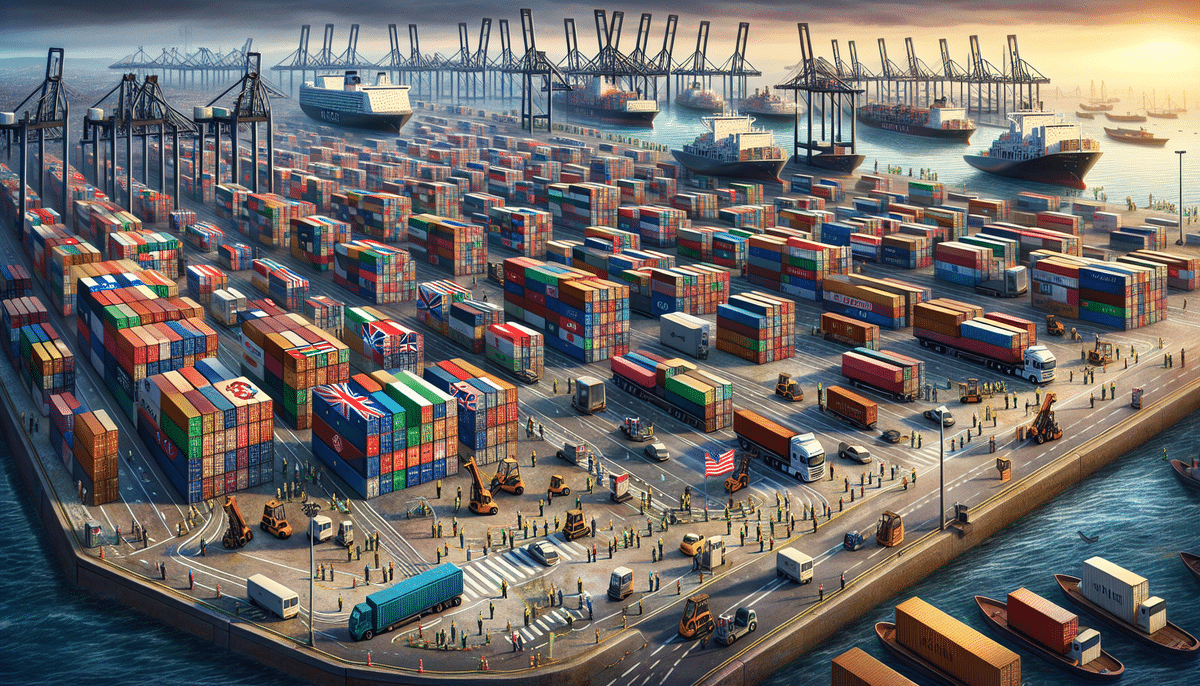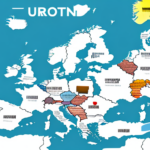Examining the Impact of Brexit on Global Logistics
Brexit, the withdrawal of the United Kingdom (UK) from the European Union (EU), remains a pivotal event for the logistics industry, profoundly affecting the movement of goods across borders and the complex logistical processes underpinning global trade. This article delves into the multifaceted impact Brexit has had and continues to exert on the global logistics sector. From understanding the fundamentals of Brexit and its significance to global logistics to exploring expert insights on future outlooks, each aspect is examined comprehensively.
Introduction: What is Brexit and Why is It Important to Global Logistics?
Brexit signifies the UK's decision to exit the EU, a political and economic union established by the Treaty of Rome in 1957. This departure has profound implications for global logistics, particularly in the movement of goods between the UK and the remaining 27 EU member states. The introduction of potential delays and additional costs associated with trade can disrupt established supply chains and logistical frameworks.
A primary concern for the logistics industry is the uncertainty surrounding future trade agreements between the UK and the EU. Ambiguities related to tariffs, customs procedures, and regulatory standards complicate logistics planning and adaptation. According to the Office for National Statistics, investment in the UK logistics sector has seen a cautious decline as companies hesitate to commit to long-term projects amidst an unpredictable trade landscape.
Furthermore, Brexit affects the movement of people within the logistics sector. The industry heavily relies on a skilled workforce, including many employees from EU member states. Uncertainties surrounding immigration policies post-Brexit have raised concerns about workforce availability, potentially leading to labor shortages and decreased operational efficiency in logistics operations.
The Historical Context of Brexit and Its Impact on Global Trade
The UK's decision to leave the EU was finalized following a referendum on June 23, 2016, where 52% voted to leave and 48% voted to remain. This decision introduced significant uncertainty and anxiety for businesses globally, given the UK's role as a major trading partner for numerous countries. Brexit has immediately influenced global trade dynamics, with ongoing negotiations posing challenges for future business planning.
Businesses are particularly concerned about the establishment of new trade barriers between the UK and the EU, which could lead to increased costs and delays for cross-border trade. Additionally, the UK's pursuit of new trade agreements outside the EU introduces further uncertainties, potentially reshaping global trade patterns. The World Bank highlights that the full ramifications of Brexit on global trade are still unfolding, with significant implications anticipated for worldwide businesses and economies.
Overview of the Impact of Brexit on Tariffs and Customs
One of the foremost concerns post-Brexit is the potential increase in tariffs and customs duties as the UK exits the EU's customs union. Businesses trading with the UK may encounter additional costs when importing or exporting goods, potentially diminishing their competitiveness in the global market. The uncertainty surrounding future tariff arrangements complicates supply chain and logistics process planning.
Compliance with new regulations and paperwork requirements is another significant challenge. Companies might need to invest in additional staff or new technologies to adhere to updated customs protocols, leading to increased operational costs and administrative burdens.
Moreover, Brexit may necessitate the UK to negotiate new trade deals with non-EU countries, introducing varying tariff rates and customs procedures. This could further destabilize existing logistics frameworks, requiring businesses to adapt their supply chains to align with new regulatory landscapes.
How Brexit Affects Transportation and Shipping Patterns
The seamless movement of goods across borders is integral to global logistics, and Brexit has the potential to significantly disrupt transportation and shipping patterns. Enhanced border checks and customs inspections can lead to delays and increased costs for businesses reliant on timely deliveries. Transportation operators may need to revise their routes and schedules to accommodate changes in customs procedures and border crossing protocols.
The uncertainty surrounding post-Brexit regulations and trade agreements adds another layer of complexity. Changes in tariffs, quotas, and trade policies resulting from the UK's departure from the EU can alter the flow of goods between the UK and other countries, making supply chain planning and investment more challenging and potentially leading to further inefficiencies.
Additionally, Brexit impacts labor availability in the transportation and shipping industries. Many workers in these sectors originate from EU countries, and stricter immigration policies could lead to labor shortages and heightened operational costs for businesses dependent on these workers for transporting and delivering goods.
Changes in Documentation Requirements for International Trade Post-Brexit
The UK's exit from the EU necessitates changes in documentation for international trade. Businesses engaged in importing or exporting goods must provide additional information to customs authorities, resulting in increased costs and administrative tasks. Staying abreast of these documentation changes is crucial to prevent disruptions in supply chains and logistics operations.
A significant alteration post-Brexit is the requirement for customs declarations for all goods moving between the UK and the EU. Detailed information about the goods, including value, origin, and destination, must be provided. Incomplete or inaccurate declarations can lead to delays or fines, emphasizing the need for meticulous documentation practices.
Furthermore, businesses may need to secure new licenses or certifications to continue trading with the EU after Brexit. For instance, exporters of certain goods like food or chemicals may require new licenses to comply with EU regulations. Comprehensive research and understanding of these new licensing requirements are essential for seamless and legal trading with the EU.
Analysis of How Brexit Impacts Supply Chain Management
Brexit introduces significant challenges for supply chain management, compelling businesses to rethink their strategies and processes to minimize disruptions from border delays and altered documentation requirements. Agility and flexibility in supply chain management are paramount to navigating the evolving post-Brexit landscape.
Increased costs are a notable impact, as the UK's departure from the EU may result in tariffs and trade barriers that escalate the cost of importing and exporting goods. This can lead to higher consumer prices and reduced profit margins for businesses. According to the European Council, businesses need to strategize to mitigate these financial impacts effectively.
Enhanced inventory management becomes essential due to potential border delays and new documentation protocols. Businesses might need to maintain higher inventory levels to meet demand, which can increase storage costs and necessitate additional warehouse space, further straining logistics operations.
The Impact of Brexit on the UK Economy and Its Effect on Global Logistics
The UK, being one of the world's largest economies and a key player in global trade, faces significant economic shifts due to Brexit. These changes have direct and indirect implications for global logistics. The UK's departure from the EU can alter trade relationships, potentially creating new opportunities for businesses in other regions while disrupting existing ones.
Short-term implications of Brexit on the UK economy include fluctuations in GDP, trade balances, and investment levels. Long-term effects may encompass structural changes in trade patterns, labor markets, and regulatory standards, all of which impact global logistics operations. Continuous monitoring and adaptive strategies are essential as the full economic consequences of Brexit unfold.
The Potential for New Trade Agreements Post-Brexit
Post-Brexit, the UK is actively negotiating new trade agreements with countries worldwide, including the United States and several Commonwealth nations. These agreements aim to mitigate the negative impacts of Brexit on the UK economy by securing favorable trade terms that enhance competitiveness in the global marketplace.
New trade deals can present opportunities for businesses operating in the UK by opening up access to new markets and reducing trade barriers. However, the negotiation process is complex and time-consuming, with the final terms significantly influencing global trade dynamics and logistics strategies. The UK Department for International Trade provides updates on ongoing negotiations and finalized agreements, which are crucial for businesses to stay informed and adapt accordingly.
Challenges Facing Businesses Adapting to the New Post-Brexit Reality
Adapting to the post-Brexit landscape presents several challenges for businesses, particularly those in the logistics sector. Technical, regulatory, and operational adjustments require substantial investment and resource allocation. Key challenges include:
- Re-evaluating and restructuring supply chain networks and relationships to adapt to new trade realities.
- Assessing and managing tariffs and customs duties to minimize financial impacts.
- Adjusting transportation routes, modes, and logistics practices to comply with updated regulations and procedures.
- Investing in technology and infrastructure to meet new documentation and compliance requirements.
These adjustments necessitate strategic planning and a proactive approach to ensure resilience and continuity in operations amidst the evolving post-Brexit environment.
Case Studies of Companies Navigating the Changing Logistics Landscape After Brexit
Global companies are actively adapting to the post-Brexit logistics landscape through strategic investments and operational adjustments. For example, UPS has invested in new customs clearance facilities in the UK to streamline the flow of goods between the UK and the EU, reducing delays and improving efficiency. Similarly, DHL has expanded its infrastructure and implemented advanced tracking systems to better manage cross-border shipments post-Brexit.
These case studies illustrate how major logistics players are proactively addressing Brexit-induced challenges by enhancing their operational capabilities and investing in technologies that promote seamless trade flows. Such initiatives not only mitigate disruptions but also position companies to capitalize on new opportunities arising in the post-Brexit trade environment.
Expert Opinions on the Future Outlook for Global Logistics in a Post-Brexit World
Industry experts project that Brexit will continue to shape the global logistics landscape for years to come. The ultimate impact hinges on the final terms of the UK-EU negotiations and the adaptability of businesses to the new trade environment. Experts emphasize the need for innovative approaches to logistics and supply chain management to navigate these changes effectively.
"Flexibility and agility are crucial for logistics companies to mitigate the ongoing impacts of Brexit," states Dr. Emily Thompson, a logistics strategist at the Chartered Institute of Procurement & Supply. She emphasizes that companies must adopt resilient strategies, such as diversifying supply sources and investing in technology, to remain competitive.
Many experts also highlight the potential for technological advancements to counterbalance Brexit-related disruptions. Implementing solutions like artificial intelligence for predictive analytics and blockchain for enhanced transparency can significantly improve supply chain resilience.
Conclusion: Key Takeaways from Analyzing the Impact of Brexit on Global Logistics
Brexit has undeniably reshaped the landscape of global logistics, underscoring the necessity for more resilient and adaptive supply chains. The logistics industry must collaborate to mitigate Brexit's negative impacts by embracing flexibility, responsiveness, and innovation. Key strategies include:
- Relocating distribution centers to optimize proximity to key markets.
- Reassessing transportation modes and routes to enhance efficiency.
- Implementing advanced regulatory procedures to ensure compliance.
- Redefining supply chain networks to accommodate new trade realities.
By adopting these measures, businesses can enhance their resilience and maintain responsiveness to both current and future market conditions in the post-Brexit era.




















